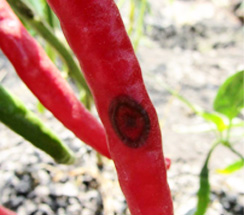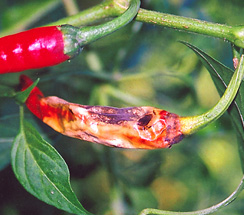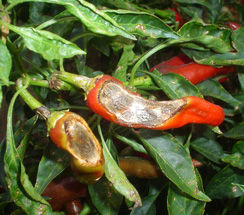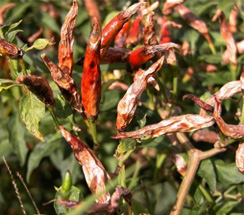| Anthracnose: Colletotrichum capsici |
Symptom:
- Ripe fruits turning red are affected
- Small, black, circular spot appears on the fruit skin
- Badly diseased fruits turn straw colour or pale white colour, lose their pungency
- Diseased cut open fruits - lower surface of the skin is covered with minute, elevated sclerotia
- Advanced stage - seeds covered by a mat of fungal hyphae, turn rusty in colour
|
 |
 |
 |
 |
| Black circular spot |
Straw colour chilli |
White colour chilli |
Rotten chillis |
|
Identification of pathogen:
- Mycelium - septate and inter and intra cellular
- Acervuli and stroma on the stem are hemispherical
- Conidia - in mass appear pinkish
Favourable conditions
- Temp - 28°C, RH - 95%
- High humid conditions when rain occurs after the fruits have started to ripe
Mode of spread
- Seed borne
- Secondary spread is by air borne conidia & rain
- Flies and other insects – responsible for dissemination of the spores from one fruit to another
|
Management:
- Use disease free seeds
- seed treatment - thiram 2 kg/ha or zineb 2.5 kg/ha
- Three sprayings with captan 0.2 %- 1st spraying - just before flowering, 2nd at the time of fruit formation and 3rd - fortnight interval after second spraying
Biocontrol
- P. fluorescens, Bacillus subtilis -effective (Rajavel, 2000)
- P. fluorescens and T. viride (Muthuraj, 1998)
- Saccharomyces cerevisiae & P. fluorescens (Jayalakshmi et al., 1998)
- Essential oil - Nigella sativa - antimicrobial activity
|
Source of Images:
http://agropedia.iitk.ac.in/sites/default/files/uas%20raichur/cotton%20bollworm/water%20soaked%20lesion%20on%20fruits.jpg
http://www.chileplanet.eu/diseases.html
http://www.apsnet.org/publications/imageresources/Pages/IW000078.aspx
http://uasr.agropedias.in/content/chilli-anthracnose |




